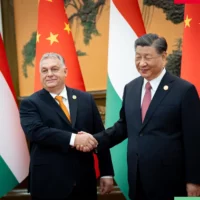U.S. begins to withdraw from WHO
The United States has officially moved to withdraw from the World Health Organization (WHO) as its national count of COVID-19 cases is approaching 3 million with over 130,000 deaths.
On Tuesday, Congress received formal notification of the decision from President Donald Trump, tweeted Democratic Senator Bob Menendez, ranking member of the Senate Committee on Foreign Relations.
“To call Trump’s response to COVID chaotic & incoherent doesn’t do it justice. This won’t protect American lives or interests — it leaves Americans sick & America alone,” Menendez said.
Stephane Dujarric, spokesman for UN Secretary-General Antonio Guterres, confirmed on Tuesday that the United States had submitted its withdrawal notification to Guterres on Monday.
According to the spokesman, the United States is a party to the WHO Constitution since June 1948, and its participation in the organization was accepted by the World Health Assembly “with certain conditions set out by the U.S. for its eventual withdrawal from the WHO.”
“The said conditions include giving a one-year notice and fully meeting the payment of assessed financial obligations,” said Dujarric.
MOUNTING CRITICISMS
Trump and his administration have repeatedly assailed the WHO for months and threatened to cut ties with the organization. In mid-April, he announced that his administration would halt U.S. funding to the international health agency.
The administration’s move “has few supporters, even from Republicans in Congress,” noted Lauren Clason in a story posted on Roll Call, a newspaper and website published in Washington, D.C., on Tuesday.
“I disagree with the president’s decision,” said Chair of Senate Committee on Health, Education, Labor and Pensions Lamar Alexander — a top Republican — in a statement.
“Withdrawing U.S. membership could, among other things, interfere with clinical trials that are essential to the development of vaccines, which citizens of the United States, as well as others in the world, need,” said Alexander, the senior Senator from Tennessee.
According to a piece published by the Hill, public health experts and Democrats have also raised alarms that the decision may be “short-sighted and could undercut the global response to the pandemic.”
“The timing of the administration’s decision has drawn intense scrutiny and is likely to spur questions about U.S. involvement in global efforts to develop a coronavirus vaccine,” said the Hill report.
“Abandoning our seat at the table leaves the United States out of global decision-making to combat the virus and global efforts to develop and access vaccines and therapeutics, leaving us more vulnerable to COVID-19 while diminishing our position as the leader in global health,” said Thomas File, Jr., president of the Infectious Diseases Society of America, in a statement.
“This decision is irresponsible, reckless, and utterly incomprehensible. Withdrawing from the @WHO in the midst of the greatest public health crisis of our lifetime is a self-destructive move. More Americans will be hurt by this careless choice,” tweeted Eric Swalwell, representative for California’s 15th congressional district in the House.
BEHIND THE DECISION
In the battle against the COVID-19 pandemic, different groups in Washington have…
Source: Xinhua
please make a donation here
Hot news
Hungarian justice minister: Brussels does not focus on real problems
What happened today in Hungary? — 25 April, 2024
Azerbaijan supplies gas to Hungary for the first time in history
Chinese President to visit Budapest: why is Xi coming to Hungary?
Breaking: Hungarian government to sue Spar
Attention: Budapest-Vienna railway line renovation continues in Hungary, timetable changes





1 Comment
One of the few good things “Don the Con” Trump has done. I seldom ever agree with that idiot but the WHO is NOT a trustworthy group to be placed in charge of anything much less global healthcare.